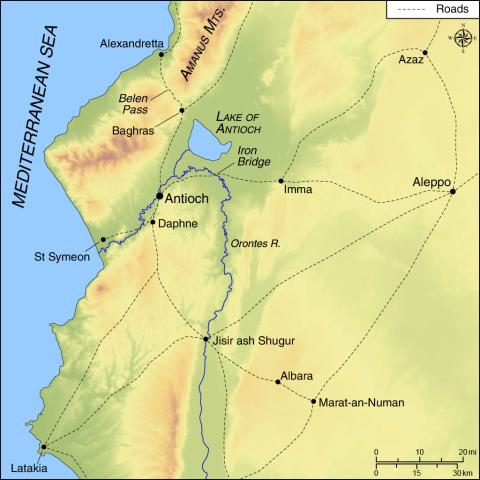The March to Jerusalem
[10.31.1] Nōn post multum vērō temporis vēnit vir venerābilis Raimundus comes dē Sānctō Egidīō, et intrāvit in Saracēnōrum terram, et pervēnit ad quamdam urbem quae vocātur Albāra, quam invāsit ūnā cum suō exercitū, eamque continuō cēpit; et occīdit omnēs Saracēnōs et Saracēnās, māiōrēs et minōrēs, quōs ibi repperit. Quam, postquam suō continuit imperiō, ad Chrīstī revocāvit fidem; quaesīvitque cōnsilium ā suīs sapientissimīs vīrīs, ut epīscopum in hāc urbe dēvōtissimē praeordinārī faceret, quī illam ad Chrīstī cultum fidēliter revocāret, et, dē domō diabolicā, templum Deō vīvō et vērō, et ōrācula sānctōrum, cōnsecrāret. Novissimē ēlēgērunt quemdam honōrābilem ac sapientissimum vīrum, et dūxēre illum in Antiochīam ad cōnsecrandum. Factumque est ita; aliī autem quī in Antiochiā remānserant, fuērunt ibīdem cum gaudiō et laetitiā.
notes
(August 1098) Raymond of Toulouse leads an expedition that captures the town of Albara and kills all the Muslims. He provides the town with a bishop, to lead the Christian community and to convert the local mosque into a church.
Raimundus comes dē Sānctō Egidīō: Raymond of Toulouse, Count of Saint Gilles.
Albāra: Al-Bara, a small but important city at the time.
Quam: = Albāram.
ut epīscopum ... dēvōtissimē praeordinārī faceret: “how he (Raymond) might see to it that a bishop would be ordained in the most correct manner.” Raymond wanted to make sure the ordination was strictly canonical.
quī illam ... revocāret: = quī (epīscopum) revocāret (Albāram).
dē domō diabolicā, templum ... et ōrācula sānctōrum: the new bishop would convert a mosque to a church, which would have chapels dedicated to saints.
honōrābilem ac sapientissimum vīrum: his name was Peter of Narbonne.
dūxēre: 3rd pl. pf. act. ind.
ad cōnsecrandum: “to be consecrated,” i.e., to be created a bishop.
vocabulary
ūnā: in the same place, at the same time, together; at once
continuō: immediately, forthwith
repperiō (reperiō) (4): to find again, discover
cultus –ūs, m.: a laboring, care, cultivation; an honoring, veneration
ōrācūlum –ī n.: oracle (CL); shrine (ML)
novissimē: finally, in the end
laetitia –ae, f.: joy, exultation, rejoicing

